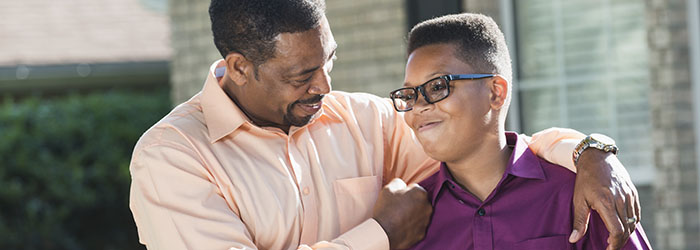I’ve noticed a tremendous inconsistency throughout my years of eating disorder treatment. When I was in treatment for anorexia nervosa purging type, one of the first parts of my recovery was weight restoration. I felt like before I even got into the work of dissecting how/where my eating disorder started, I was required to gain weight. Yet years later when I went to treatment for binge eating disorder (BED) and was at my highest weight, I assumed the first thing my treatment team would focus on would be weight loss, but they didn’t, and they said that wasn’t going to be a part of my treatment plan.
According to eating disorder treatment professionals I have worked with, if a client is underweight they are told to gain weight, and then learn to accept their medically stabilized body. However, if a client is overweight they’re told they’re just clinging to the idea of a “perfect body.” On one side of the pendulum, they’re required to reach what is deemed a healthy body weight, yet on the other side they’re told the number doesn’t matter, and it’s what’s inside that’s important. All different types of eating disorders cause different outcomes on the body. So why is it only okay to focus on healthy weight maintenance when someone is underweight?
I’ve been wondering about this contradiction for a few years now and wanted to explore what other people’s thoughts were on the matter. I interviewed Erin Beery, LCSW, and 2008 Portland State University graduate who has been in private practice in Portland, Oregon, since 2011. Beery’s many specialties include LGBTQ and gender identity issues, anxiety, eating disorders, trauma and PTSD, as well as depression.
In addition to having a professional opinion such as Beery’s, I also wanted to hear from someone who knows personally what it’s like to struggle with an eating disorder. I interviewed Colleen Werner who is a professional dancer, writer, and mental health/body-positivity/self-love advocate, and in recovery from her eating disorder. Werner is a member of Long2 Dance Company in New York City, teaches dance in Long Island, New York, and is currently studying Psychology at SUNY Old Westbury.
I wanted to know if Beery and Werner felt it was common for people with eating disorders to be viewed as more or less serious depending on their weight. Beery states, “The focus on needing there to be this link around weight in order to be diagnosed with anorexia has really shut out the conversation for those who don’t match the stereotype, but fall somewhere else along the spectrum.” Werner explains, “Many people are very ignorant about what eating disorders really are and, as a result, people who are underweight are often taken more seriously because it’s considered more dangerous.”
Insurance companies base a significant part of their coverage decisions on someone’s weight, rather than looking at their overall mental and physical health. Werner’s stance is that, “Eating disorders are mental illnesses, and someone’s struggle can’t be defined by their BMI.” She continues, “All eating disorders are dangerous and deserve treatment.” Beery has experienced frustrations from seeing her own clients be denied coverage simply because of a number on a scale. She explains, “Insurance is not a mental health business, so making those determinations is not in their area of expertise. Insurance companies go off of this cookie cutter idea of what an eating disorder is supposed to look like.”
I was curious why people thought that weight restoration should be a common part of treatment for anorexia, but not binge eating disorder. Werner thought, “In the case of anorexia, being underweight can be more detrimental health-wise than being overweight. In some cases, there are definitely health risks associated with being overweight, but I think they can be handled in a slower way than the risks of being underweight.”
While I understand that there can be genuine health concerns, I still couldn’t help but wonder why there appears to be a large difference between losing and gaining weight. Beery explains her perspective, “If someone’s already been identified as struggling with having a healthy relationship around body image, and food… then the best way we [mental health professionals] know to support that is to shift the lens off of weight and food, and put the lens more on someone’s own self agency and control, and explore the things around it that might be the contributing issues.”
Lastly, I wanted to know if Beery and Werner had any ideas on how to create more balance among the discussion and treatment for eating disorders. Werner explains, “I think education is the most important step. We need to provide people with evidence based research and statistics so that they can be properly informed as to what eating disorders truly are.” Beery believes, “Keeping it as part of the conversation will help resources become more developed.” As a passionate eating disorder recovery advocate Werner states, “Eating disorders are the most deadly of all mental illnesses. They need to be taken seriously, so that lives can be saved.”
In February 2017, Lexie Manion, a blogger, mental health advocate, and in recovery from an eating disorder herself, started a campaign called “#BoycottTheBefore.” It took me some time to fully understand Manion’s concept and intentions. I’ve posted before/after photos of my eating disorder recovery, and after her campaign launched back in February, I asked myself what was wrong with those posts. The short answer is nothing, but the reality is that I felt the need to show people that I too was underweight at one point so that they would deem my eating disorder valid. However, I know from personal experience that eating disorders are far more mental than physical.
I try to be an advocate for the awareness of eating disorders, but I didn’t realize until recently that those before/after photos are in fact one of many contributing factors and I had been a part of the problem. Beery shared that some of her clients who are overweight tend to feel invisible. She states, “We live in a society, and in a culture that’s pretty obsessed with weight in lots of ways. There’s an obsession with thinness.”
Suddenly, I completely understood why Manion’s campaign is so important and crucial to eating disorder awareness and ending the double standard. It makes people like myself who are in recovery and have good intentions to question why exactly we are posting a before/after photo, and why have I kept those photos for so long? I believe asking these questions are where the work begins. I want to figure out a way to destroy the double standard. If that can be accomplished then I will feel one step closer to ending the stigma around eating disorders.
Emily Locke is a college student, dancer, and blogger. She is transferring to North Carolina State University in fall of 2017, and plans to double major in Psychology and English. She has battled mental illnesses from a young age, and as a result is very passionate about raising awareness for eating disorders, anxiety and depressive disorders, and promoting a positive body image. She hopes to someday be a published author and eating disorder activist.






